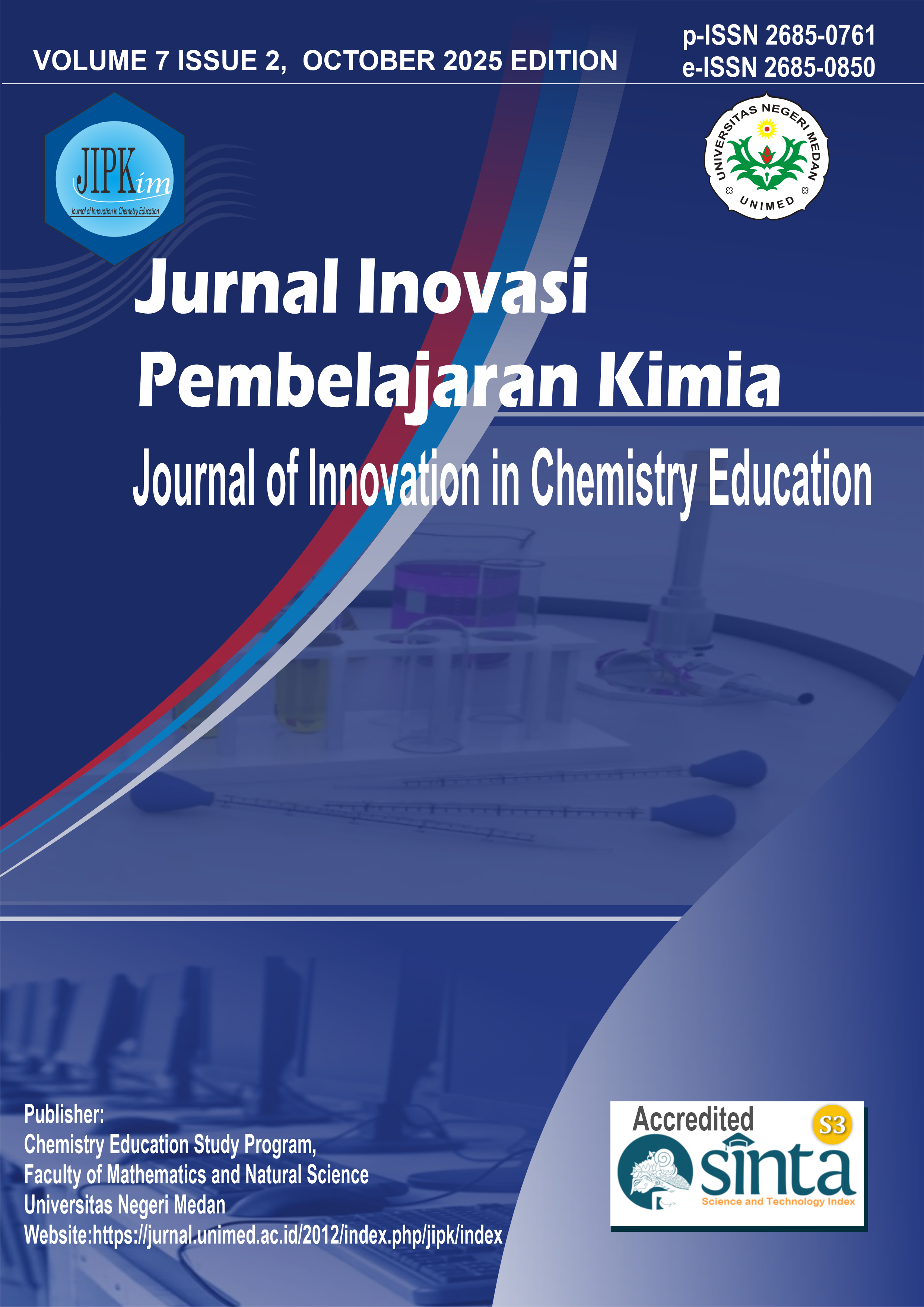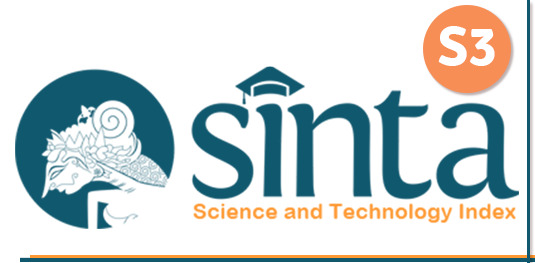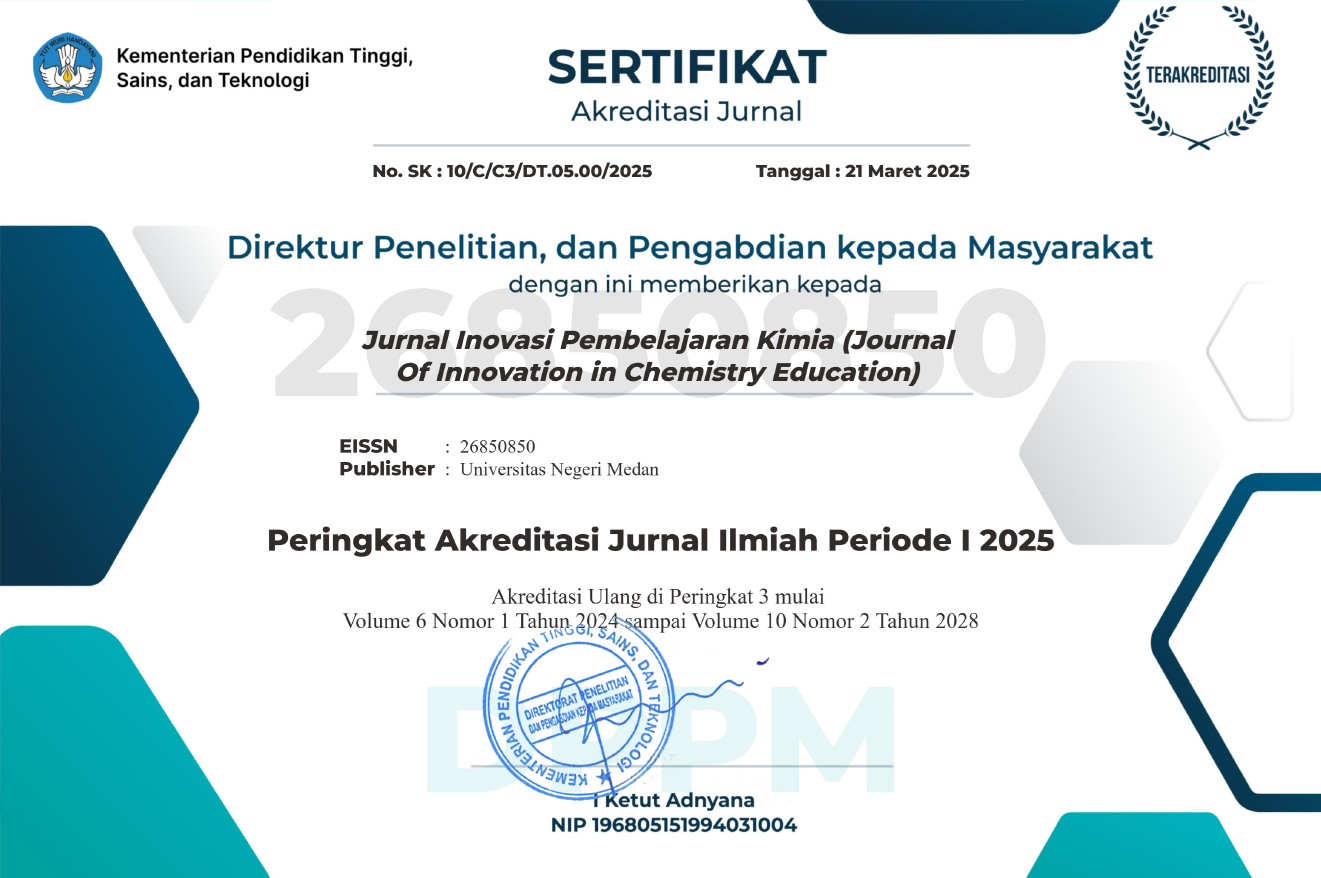Development of Problem-Based Learning E-Module to Enhance Students’ Critical Thinking on Acid-Base Material
DOI:
https://doi.org/10.24114/jipk.v7i2.67347Keywords:
acid base , critical thiking skills, e-module, problem based learningAbstract
Acid-base concepts are often abstract and difficult for students to understand, limiting the development of their critical thinking skills. At SMAS An-Nizam Medan, current learning models have not been fully effective in promoting student engagement or enhancing these skills. This study aims to develop a Problem-Based Learning (PBL) e-module to improve students’ critical thinking and to evaluate its validity and practicality. The research uses a Research and Development (R&D) method based on the Borg and Gall model, limited to the seventh stage. The participants consisted of two chemistry lecturers (as media and material experts), one chemistry teacher, and students from Class XI Al-Khawarizmi at SMAS An-Nizam Medan. Data were collected using a questionnaire adapted from BSNP standards. The results showed that the PBL-based e-module was valid, with an average score of 85.75% from material experts, 95.48% from media experts, and 100% from the teacher classified as highly valid. Student responses showed a practicality score of 87.97%, indicating that the module is very practical. In conclusion, the developed PBL-based e-module is valid and practical, making it suitable for use in teaching acid-base chemistry material to support the development of students’ critical thinking skills.References
Abdullah, A., Danial, M., & Anwar, M. (2021). Pengembangan E-Modul Asam Basa Berbasis Problem Based Learning melalui Google Classroom pada Sekolah Menengah Kejuruan (SMK). CER: Chemistry Education Review, 5(1), 86–99. https://doi.org/10.26858/cer.v5i1.13315
Andriani, M., Muhali, M., & Dewi, C. A. (2019). Pengembangan Modul Kimia Berbasis Kontekstual Untuk Membangun Pemahaman Konsep Siswa Pada Materi Asam Basa. Hydrogen: Jurnal Kependidikan Kimia, 7(1), 25. https://doi.org/10.33394/hjkk.v7i1.1653
Asmi, A., Silaban, S., & Silaban, R. (2024). Developing An Interactive Chemistry E-module Based on Problem-based Learning to Improve Critical Thinking Skills of High School Students. Jurnal Paedagogy, 11(1), 94. https://doi.org/10.33394/jp.v11i1.9875
Dalimunthe, M., & Ginting, R. J. (2022). Pengembangan Modul Berbasis Problem Based Learning dengan Pendekatan Saintifik pada Materi Asam-Basa. Jurnal Inovasi Pembelajaran Kimia (Journal Of Innovation in Chemistry Education), 4(2), 177–190. https://doi.org/10.24114/jipk.v4i2.3 8991
Elvarita, A., Iriani, T., & Handoyo, S. S. (2020). Pengembangan Bahan Ajar Tanah Berbasis E-Modul Pada Program Studi Pendidikan Teknik Bangunan, Universitas Negeri Jakarta. Jurnal PenSil, 9(1), 1–7. https://doi.org/10.21009/jpensil.v9i1.11987
Ginting, T. F., & Dibyantini, R. E. (2024). Implementation of an Integrated Project Based Learning Model for Generic Science Skills in Acid-Base Material. Jurnal Inovasi Pendidikan Kimia (Journal of Innovation in Chemistry Education), 6(2), 179-187.
Kimianti, F., & Prasetyo, Z. K. (2019). Pengembangan E-Modul IPA Berbasis Problem Based Learning untuk Meningkatkan Literasi Sains Siswa. Kwangsan: Jurnal Teknologi Pendidikan, 7(2), 91. https://doi.org/10.31800/jtp.kw.v7n2.p91--103
Kartikasari, S., Abudarin, A., & Fatah, A. H. (2021). Pengembangan e-modul pembelajaran mandiri materi senyawa hidrokarbon pada siswa kelas XI SMA Negeri 3 Palangka Raya. Journal of Environment and Management, 2(2), 170–180. https://doi.org/10.37304/jem.v2i2.2946
Redhana, I. W. (2019). Mengembangkan Keterampilan Abad Ke-21 Dalam Pembelajaran Kimia. Jurnal Inovasi Pendidikan Kimia (Journal of Innovation in Chemistry Education), 13(1), 2239–2252. https://doi.org/https://doi.org/10.152 94/JIPK.v13i1.17824
Saputri, M. A. (2020). Penerapan Model Pembelajaran Problem Based Learning Untuk Meningkatkan Kemampuan Berpikir Kritis Siswa Kelas V Sekolah Dasar. Jurnal Pendidikan dan Konseling (JPDK), 2(1), 92-98.
Sari, M. P., Andromeda, A., & Hardinata, A. (2020). Studi Kesulitan Belajar Mahasiswa Jurusan Pendidikan IPA dalam Mempelajari Sifat Periodik Unsur. Jurnal Eksakta Pendidikan (JEP), 4(1), 18. https://doi.org/10.24036/jep/vol4-iss1/379
Sianturi, J., & Panggabean, F. T. M. (2019). Implementasi Problem Based Learning (PBL) menggunakan Virtual Dan Real Lab Ditinjau dari Gaya Belajar Untuk Meningkatkan Hasil Belajar Siswa. Jurnal Inovasi Pembelajaran Kimia (Journal of Innovation in Chemistry Education), 1(2), 58–63. https://doi.org/10.24114/jipk.v1i2.1 5460
Sugiharti, G., Siregar, M. I., Samosir, D., & Anugrah, A. N. (2024). Improving Student’s Critical Thinking Ability Using HOTS-Based Modules in Chemistry Learning. Journal of Ecohumanism, 3(4), 118–127. https://doi.org/10.62754/joe.v3i4.3494
Supriyono. (2022). Research and Development in Education: Borg and Gall Model. Bahan Ajar. Blitar: FKIP Universitas Islam Blitar. ResearchGate. https://www.researchgate.net/profile/Supriyono-Supriyono-10
Sutiani, A., & Fayaddah, F. (2021). Pengembangan Lembar Kerja Siswa (LKS) Berbasis Model Pembelajaran Inkuiri Terbimbing Pada Materi Termokimia. Jurnal Inovasi Pembelajaran Kimia (Journal of Innovation in Chemistry Education), 3(2), 106–115. https://doi.org/10.24114/jipk.v3i2.2 8174
Susilawati, E., Agustinasari, A., Samsudin, A., & Siahaan, P. (2020). Analisis Tingkat Keterampilan Berpikir Kritis Siswa SMA. Jurnal Pendidikan Fisika dan Teknologi, 6(1), 11–16. https://doi.org/10.29303/jpft.v6i1.1453
Tohir, M. (2019). Hasil PISA Indonesia Tahun 2018 Turun Dibanding Tahun 2015. Open Science Framework. https://doi.org/10.31219/osf.io/pcjvx













